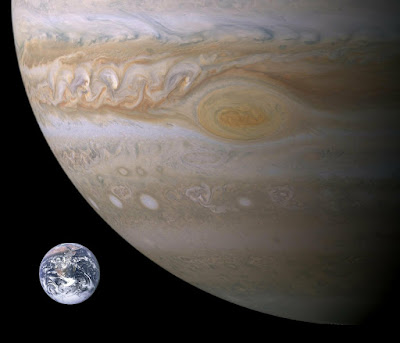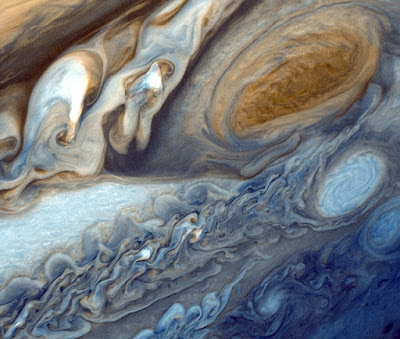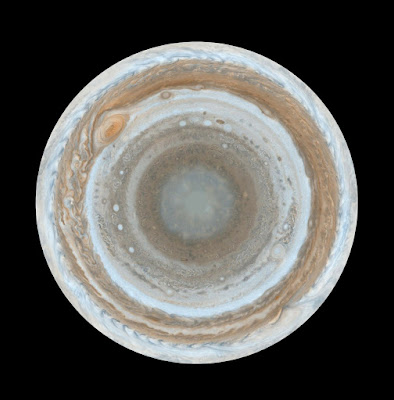What If We Dumped Our Trash on Jupiter?
Jupiter is the largest planet in the solar system and the fifth one from the sun. A gas giant that doesn't have a hard surface. Jupiter isn't suitable for human life, but this doesn't mean it's useless. Why not send all of our garbage there? In the end, it's unlikely we'll be able to pollute such a huge planet. Moreover, it can easily handle our waste well. I conducted a study and here's what came of it. Jupiter has an extremely large mass. So, its gravity is also strong, together with the sun.

The gravitational influence of Jupiter once helped shape the solar system. Can you imagine its power? It influences various dangerous space objects. And it's no coincidence that it's called the vacuum cleaner of the solar system. Jupiter often attracts objects that get too close to it. And as such, it experiences about two hundred times more asteroid and comet impacts than the Earth. Some scientists even believe that in this way it protects the inside of the solar system.
What If We Dumped Our Trash on Jupiter?
Thanks to its gravity, Jupiter has a large number of natural satellites, at least seventy-nine of them. Most of them have a diameter of fewer than 10 kilometers or about six miles. The four largest satellites known as the Galilean moons are IO, Europa, Ganymede, and Callisto. They can be seen from Earth with just binoculars. So, what's my point? Simply the fact that Jupiter has enough gravitational influence to hold all of these celestial objects in orbit. It's really pretty cool. So, what does Jupiter look like? If you describe it using simple words under dense clouds, there's a 25000 kilometer or fifteen thousand 5000 mile-thick layers of hydrogen with helium additives. It gradually passes from a gas to a liquid phase, and there's no clear boundary between the phases.
Jupiter is a giant boiling cauldron. The atmospheric pressure of this planet would crush any living creature in a matter of seconds. But in order to deliver trash to Jupiter, it would really take some effort. The main problem is cost. The cost of any space project is high. For example, fixing the Hubble Space Telescope. So how much would a flight to Jupiter cost? Even without people, it would be costly.
Sending items to the International Space Station costs about twenty thousand dollars per kilogram or roughly ten thousand dollars per pound. And this is a journey of about four hundred and five kilometers or 250 miles. The distance between Jupiter and the Earth varies from between five hundred and eighty-eight to nine hundred and sixty-seven million kilometers. That's between three hundred and sixty-five to six hundred and one million miles. Can you imagine how much this would cost? It's unlikely that Nationals' based programs would undertake such a project. Therefore, we'd have to use the Falcon Heavy. This is Elon Musk's super-heavy launch vehicle, which is partially reusable. One launch of the Falcon heavy without cargo costs, about one hundred fifty million dollars. Additionally, the rocket can carry a little less than sixty-four tons of weight and fifteen hundred dollars per kilogram, or about 750 dollars per pound. But this is only the cost for low earth orbit. When sent to Jupiter, the cost would increase many times over and the volume of the cargo would be smaller.

So, is there a way to deliver trash to this gas giant? Theoretically, yes. Could we do it regularly? Not yet. Humanity simply doesn't have the technology. And no one sees any reason to develop it. But is it possible to send our waste just into space?
Not to a specific planet, but out into the void. I'll say right away that it's a mediocre idea. Nobody wants to live in the middle of a landfill, especially if the landfill surrounds them from all angles. But let's say that people become indifferent to the environment and distant stars and they design a huge, gigantic weapon that fires by harnessing the power of Earth's magnetic field with its help. It would be possible to send a large amount of garbage into space, though, not to Jupiter. This garbage would go somewhere into low earth orbit. Perhaps we could even sometimes. Observe it in flight, and we would hope that in the end, we would be getting rid of waste. Let some aliens deal with it.
But let's get back to Jupiter and to our fantasy. Suppose somehow the ship still reaches the gas giant. The garbage is dumped into its atmosphere and the ship itself survives. What would happen to the waste? Jupiter has no solid surface. So, the debris would just fall through it to a certain point. The deeper it falls, the higher the pressure and temperature. In the end, it would reduce the debris into tiny particles. If there were moisture in it, it would evaporate at some point. Everything else would turn to dust and become a part of Jupiter.
Sounds good, but it's not realistic, especially given the amount of garbage that people constantly create. The world produces about two billion tons of waste every year. This includes food, waste, various packaging, hospital trash, tires, chemicals and a whole bunch of other stuff in terms of cost. It's much cheaper to leave it all here on Earth, consumed wisely, and instead of dumping in landfills, find ways to recycle because the resources of our planet aren't infinite and we will someday reach their end. But if world leaders suddenly decide that we need to send all of our unnecessary matter into space, I won't believe it. But I'll say that the sun is better suited for it.
Yes, the sun, our red hot start, thanks to which the solar system exists and there's life on earth, cannot handle our garbage. Technically, it's possible. And the sun is much closer than Jupiter. On average, only one hundred and forty-nine million six hundred thousand kilometers or 93 million miles separate us. That's about a quarter of the distance to Jupiter. In addition, the sun is a giant stone capable of destroying anything. It would be foolish not to take advantage of that. And there are still black holes. These are regions of space-time with such a strong gravitational pull that it's impossible to escape them. This would be the perfect place to store our garbage.
It seems that throwing it there wouldn't be a problem. But we don't know exactly what would happen once it's inside. It's too mysterious of a matter that requires more careful study. So, let's leave the idea of a black hole aside for now. And let's say that humanity wants to get rid of nuclear waste by sending it into space. About ninety thousand tons of such hazardous waste is currently stored in the United States. To send all of it to the nearest edge of the solar system, you'd need at least twenty-five thousand one hundred seventy-four Falcon Heavy's that would never return home.

And this is without taking failures into account. How often do rockets crash before they reach orbit? If even just one percent of the launches failed. That would amount to nine hundred tons of uncontrolled spill nuclear waste. An important note. Be careful with radioactive waste. It's one of the most dangerous things known to mankind. And this is without taking failures into account. How often do rockets crash before they reach orbit? If even just one percent of the launches failed. That would amount to nine hundred tons of uncontrolled spill nuclear waste. An important note. Be careful with radioactive waste. It's one of the most dangerous things known to mankind.
We've already discovered ways to recycle and do something useful with the rest of the trash. Every year we get better and better at this. Today, many people don't know any other way of living than, you know, taking care of the planet, sorting the garbage, and using our home wisely. In the end, it's people who created this earthly trash, and so it's people who should deal with it. As for space, it's better suited for study and exploration. That will definitely be more useful to future generations.